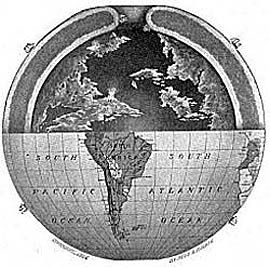About
 I have a PhD in English from the University of Liverpool. My research encompassed the history of Hollow Earth literature in the Nineteenth century as works of utopian, imperial, and spiritual aspiration.
I have a PhD in English from the University of Liverpool. My research encompassed the history of Hollow Earth literature in the Nineteenth century as works of utopian, imperial, and spiritual aspiration.
When not working on my terra cava opus, I like to study American literature, Modernist literature, Renaissance drama, science fiction, and the influence of literature on the law.


Pingback: The Problem Of Books | Outskirts of the Twenties
Hi there, I am having trouble finding your name, so I can cite you properly. I am very impressed with your website otherwise. Would you mind adding your name to your “about info”? All the best, Pernille Ipsen, University of Wisconsin
Hi, sorry, it’s Michelle K. Yost, University of Liverpool
See the San Francisco newspaper article about the deaf-blind author before being so unkind about him. He was eight when he went blind and nine when he went deaf. A remarkable man. http://cdnc.ucr.edu/cgi-bin/cdnc?a=d&d=LAH19030920.2.476.7#
Very remarkable indeed! Thanks!
Correction: Los Angeles paper
Reference: Yost rev. in EXTRAPOLATION of Erlich’s COYOTE’S SONG
About the availability of COYOTE on the SFRA site, and its formatting by Borgo Press:
(1) After a glitch on the site, the SFRA web-folk didn’t repost COYOTE, so it is no longer available on line. I’d been warned such things happened so took care to deposit hard-bound hard copy at some major libraries, possibly including Liverpool.
(2) COYOTE was written on contract to Borgo Press, and there’s a long, sad story there. The formatting is Wildside Press house style. The lack of an index has to do with medical problems that afflicted the indexer and, different medical problems, the editor.
(3) I hope you didn’t try to read the whole book through; it’s kind of encyclopedic (and, as a cover-to-cover read, interminable).
And thanks for not advertising that I messed up the plural to «Kulturkampf», which I’m putting in a variation on quotation marks that I also use for what have been unsatisfactorily called “scare quotes” for paraphrases and such.
The best form of COYOTE’S SONG is a pdf of the library-deposit version, which is nicely formatted and searchable. That is available free to anyone who (a) asks and (b) won’t rat me out to Wildside Press for giving it away. (I’m now retired, working on rare occasions as an independent scholar and a bit more often at the edges of the film industry and don’t count on royalties for a living.)
If you want the pdf — and won’t rat me out — just ask; I can e-mail it as an attachment.
Cordially,
Rich Erlich
ErlichRD@MiamiOH.edu
Thank you, Rich. I feel fortunate to have got my hands on both the hardbound and the PDF versions. To review I did have to read cover to cover, but as a reference/literary history for Le Guin scholars and enthusiasts it is irreplaceable. I wish I’d had it for some of my earlier Le Guin research.
All the very best,
M .
I came upon this reply-post (again?) while Googling something else on COYOTE’S SONG. I forget if I said “Thank you.” So, possibly again: Thank you!
And possibly also again — I’m happy you got hold of the hardbound and pdf versions. I am very grateful the Borgo/Wildside Press version is out in the world, but the hardbound and, more so, the pdf are easier to use.
I feel like this is the wrong forum for this, but I’m not sure how else to contact you. You are likely the most well-read purveyor of Hollow Earth fiction out there. Would you be willing to write book a review for a contemporary novel with a Hollow Earth setting?
Sure. I’ve done it before, and I’m always interested to see how the genre continues to evolve.
Greetings from Nequa – I lost the email address I had for you. I still have 600 Nequa reprints in my basement. Any ideas on how to put them into hands that will maybe read them? At least I got forces to ebook Nequa so it is more available then before I started. Serious suggestions are solicited.
Mark